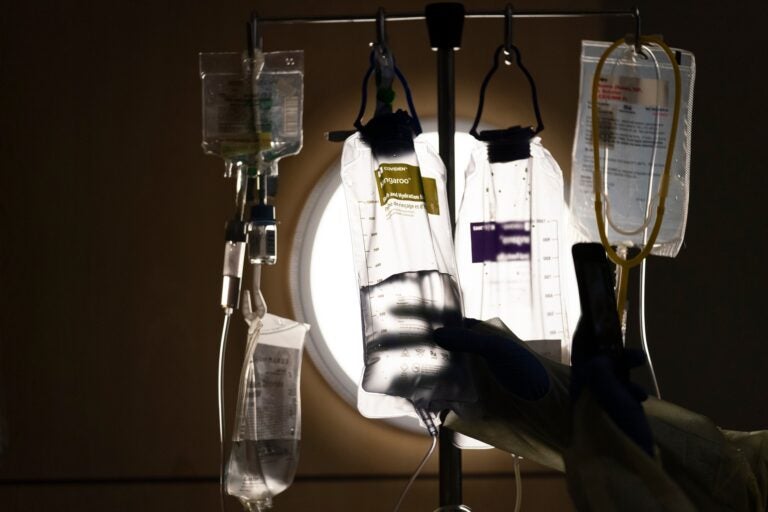‘We really can’t do our job without IV fluids’: How Philly-area hospitals are dealing with shortages caused by Hurricane Helene
Hurricane Helene shut down a factory in North Carolina that makes more than half of the U.S. supply of intravenous fluids. Hospitals use them everyday.
Listen 1:39
File: Nurse manager Edgar Ramirez checks on IV fluids while talking to a COVID-19 patient at Providence Holy Cross Medical Center in Los Angeles, Dec. 13, 2021.
From Philly and the Pa. suburbs to South Jersey and Delaware, what would you like WHYY News to cover? Let us know!
Hospitals in the region are keeping a careful eye on their IV fluid supplies, and are using less of the precious liquid as a way to cope with supply shortages in the wake of Hurricane Helene.
The powerful storm damaged a factory in North Carolina that produces more than half the United States’ supply of intravenous fluids, or IV fluids. The factory’s shutdown has led to a national shortage of IV fluids, and health care workers in Philadelphia and the surrounding region are doing what they can to conserve supplies.
IV fluids are essential to hospital care, when patients need fluids but can’t drink. This includes patients who are too sick to swallow, lost a lot of blood or need to get drugs infused, as well as babies in intensive care.
“It’s as ubiquitous as a Band-Aid or a scalpel,” explained Dr. Jonathan Stallkamp, chief medical officer at Main Line Health, which runs five hospitals in southeastern Pennsylvania. “We really can’t do our job without IV fluids.”
He said that since last week, Main Line Health has been tracking how much IV fluid it uses, and using less of it. For instance, if a patient can still drink, health care workers might give them a bottle of Gatorade instead of an IV. Or, a nurse may inject a medication with a syringe and flush it with a small amount of saline, which uses far less fluid than the usual practice of putting the medication in a bag of IV fluid that an electronic pump pushes into the patient.
Stallkamp added that Main Line Health is reviewing their orders every 24 hours, and that they have been receiving only about 40% of their usual supply of IV fluid.
“We’re looking at literally almost everything that’s out there in order to conserve.”
He said the measures have decreased the amount of IV fluid the health system uses, but they are still not at the level they need to be. He estimates this shortage could go on for weeks, or even months.
“We right now have enough fluids on tap to be able to continue to provide surgeries,” he said. “But we’ll continue to watch: There are many health systems across the country who have actually had to start to pause surgeries. And we are hoping not to be one of those.”
Penn Medicine, Jefferson Health and the Delaware Healthcare Association (on behalf of their hospitals) all said they are managing their inventory and conserving their supplies. Most Temple Health locations use a different IV supplier, but that company has also limited how much a hospital can order at a time to prevent hoarding.
Hospitals have dealt with supply chain issues before, both during the worst days of the COVID-19 pandemic and in 2017, when Hurricane Maria hit another factory in Puerto Rico that makes IV fluids, said Christopher Chamberlain, vice president of emergency management at the Hospital and Healthsystem Association of Pennsylvania.
“There is some historical precedence there … but this particular disruption ranks up there fairly high,” he said. “From an emergency management standpoint, we certainly take the standpoint of worst case scenario for this extending for an extended period of time, and then hope really for the best.”
He said people who need care should still go to their doctor or a hospital, and that people in emergency situations will get the care they need.
Earlier this week, the American Hospital Association urged the White House to declare a public health emergency and work with federal agencies to flex certain rules so that, for instance, health care workers could use IV fluids that are close to or past the labeled expiration date, and hospitals could import IV fluids that are approved by the European Union.
This comes a few months after hospitals dealt with a shortage of blood culture bottles that they routinely use to check for infections in patients’ blood. Stallkamp and Chamberlain said that situation is still ongoing, but is not as urgent as it was a few months ago.

Get daily updates from WHYY News!
WHYY is your source for fact-based, in-depth journalism and information. As a nonprofit organization, we rely on financial support from readers like you. Please give today.







